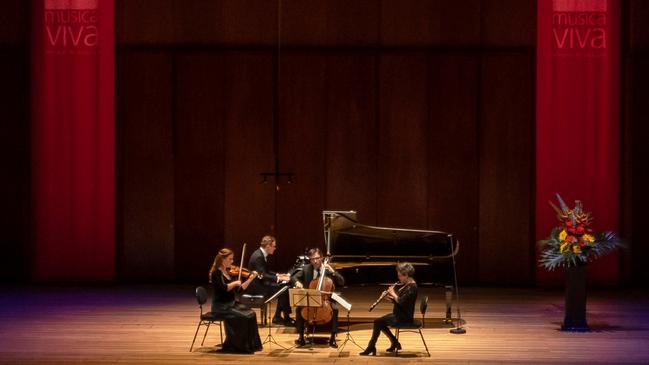Musica Viva year kicks off with a wind of change
Two works for an unusual combination of instruments are featured in Musica Viva’s return to the concert halls.

Local
Don't miss out on the headlines from Local. Followed categories will be added to My News.
- It's happy hour with Bach
- In with the new and old
- An hour that will grip you
- Easy to Handel Italian job
Czech composer Bohuslav Martinu was known for writing for unusual combinations of instruments and until now his quartet for oboe, piano, violin and cello has been the only work of its kind.
But thanks to a commission from Musica Viva’s former artistic director Carl Vine, the repertoire has doubled from around 15 minutes to 30 minutes of music with a new piece by Perth-based Australian composer Lachlan Skipworth.
Both works are being performed by Sydney Symphony principal oboist Diana Doherty and Streeton Trio in the first Musica Viva concert tour since Garrick Ohlsson’s memorable recital in February last year, a few days before the coronavirus pandemic shut concert halls.
The two quartets open and close a program which includes a piano trio – in this case Bedrich Smetana’s heart-wrenching G minor work written after his four-year-old daughter died of scarlet fever – showcasing the talents of what Vine described as Australia’s “most internationally successful” piano trio, making their spectacular debut with Musica Viva. A second Sydney concert will feature Felix Mendelssohn’s Piano Trio No.1.
Founded in Switzerland in 2008, the Streetons’ original members, violinist Emma Jardine and pianist Benjamin Kopp, have been joined by SSO principal cellist Umberto Clerici.
BRIGHT
Martinu’s quartet in two movements was written in America in 1947. Like fellow exile Igor Stravinsky, he sometimes adopted the neoclassical style. This work, while enjoyable on the ear with its restless switches of mood and pace, fails to “take off” or, as Doherty says, exploit the full scope of the oboe in its unusual setting.
Skipworth’s highly coloured piece, on the other hand – receiving its world premiere here – is both engaging and far more intellectually satisfying. The composer, who performed as a clarinetist before turning to composition, meets the challenge of the oboe’s unique bright sound palette and the varying textures of strings and piano in the three short movements, and comes up with a piece that demands to be recorded and performed again.
It opens buoyantly with a catchy five semiquaver to the beat rhythm instead of the usual four (think Dave Brubeck’s Take Five). The slow middle movement is an homage to Oliver Messiaen, a favourite composer of the work’s dedicatee, with piano and cello briefly creating the spacious feel of the Quartet for the End of Time and the Frenchman’s characteristic use of bird song from the oboe. It ends with more rhythmical trickery and vivid colours and an exciting finale that left the audience demanding an encore.
And they were not disappointed with the ensemble playing an arrangement of the Hungarian Rondo from Brahms’ first piano quartet by Doherty’s husband, Sydney Symphony cor anglais principal Alexandre Oguey.
All in all a triumphant return to the concert hall stage for Musica Viva.
Diana Doherty and Streeton Trio will perform the Martinu and Skipworth quartets with Mendelssohn’s Piano Trio No.1 at City Recital Hall Angel Place in a livestreamed concert on Monday, March 8, at 7pm.
DETAILS
●CONCERT Musica Viva: Diana Doherty & Streeton Trio
●WHERE City Recital Hall Angel Place
●WHEN March 6


